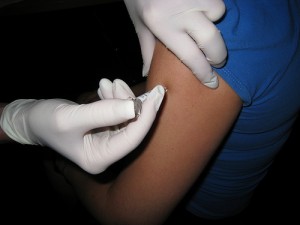Posted on 28 June 2011. Tags: centers for disease control and prevention, disease control and prevention, drink soda, drinks, food policy, fruit juices, high school students, number 1, previous year, public health problems
 A recent study shows that only one out of four high school students drink soda every day. The study suggests that this ratio shows fewer teenagers are drinking that much sugary drink anymore. Also, the researchers discovered that many high school students actually drink milk, water, and fruit juices very often.
A recent study shows that only one out of four high school students drink soda every day. The study suggests that this ratio shows fewer teenagers are drinking that much sugary drink anymore. Also, the researchers discovered that many high school students actually drink milk, water, and fruit juices very often.
Nance Bener, the study’s lead author, said that they were extremely pleased with what they discovered. Bener is also a part of the Centers for Disease Control and Prevention. Brener, however, said that they still acknowledge the fact that a quarter of American teenagers are still drinking sweetened drinks every day.
The consumption of soda is considered as one of our biggest public health problems and has been directly linked to the increase in childhood obesity rate in the United States. A study including schoolchildren in Massachusetts show that for every additional soda one takes per day, the chances of becoming obese increases by 60%. To help ease the problem, many schools voluntarily stopped selling sweetened drinks in school cafeterias.
Director of the Rudd Center for Food Policy and Obesity of Yale University, Kelly Brownell, said that it really looks like the rate of high school students drinking sweetened drinks on a regular basis is going down. In 2010, the rate dropped from 29% from the previous year to 24%.
Brownell, however, said that the results of the current study are still a bit depressing. He pointed out that even though the rates have gone down; a quarter of all high school students is still a huge number.
Posted in Health
Posted on 12 June 2011. Tags: cdc, centers for disease control, centers for disease control and prevention, disease control and prevention, dr arnold, flu seasons, flu shot, flu vaccines, health officials, strains
 The Centers for Disease Control and Prevention encourages everyone to get repeat flu shots for the coming flu seasons. However, vaccine makers suggest that some people may not necessarily need another flu vaccine this year.
The Centers for Disease Control and Prevention encourages everyone to get repeat flu shots for the coming flu seasons. However, vaccine makers suggest that some people may not necessarily need another flu vaccine this year.
Makers of flu vaccine say the shots this year will be the same as last year’s since identical strains of the virus are still going around the environment. Some experts say young and healthy people may still have adequate protection from the flu shot obtained last fall. Thus, they may skip getting it once more for this season.
However, health officials from the government say the protection offered by flu vaccines can significantly fade after some months, particularly in weak and elderly people. In fact, they are persuading everyone to get their repeat shots this year.
Vaccine makers announced that there will be plenty of flu shots coming in 2011. They said there will be enough for more than 50 percent of the population. Five manufacturers announced a couple of weeks ago that they are planning to make 166 to 173 million flu doses this year.
In the United States, the demand for flu shots has been increasing as well. Over 40 percent of the U.S. population received flu vaccines in the past 10 months, leading to a successive year when vaccinations were at a very high level.
While it is not clear whether repeat shot is needed or not, other experts believe that the position of CDC is the best possible course. Dr. Arnold Monto, a flu expert from University of Michigan, said that getting another flu vaccine is definitely not going to harm everybody.
Posted in Health
Posted on 19 March 2011. Tags: acquired immunodeficiency syndrome, centers for disease control and prevention, health officials, hiv test, immune system, mid 1980s, new york city health, organ donors, organ rejection, screening tests
 A transplant patient was infected with Acquired Immunodeficiency Syndrome or AIDS after he had received a new kidney from a living donor. This is the first case documented in the United States ever since HIV screenings were employed in the mid-1980s.
A transplant patient was infected with Acquired Immunodeficiency Syndrome or AIDS after he had received a new kidney from a living donor. This is the first case documented in the United States ever since HIV screenings were employed in the mid-1980s.
It was identified that the donor had an unprotected sex within the 11 weeks span from when he tested negative to the time the surgery was performed in 2009.
The Centers for Disease Control and Prevention suggested that organ donors should repeat screening tests for HIV one week prior to surgery, based on the report on the New York case on Thursday.
Dr. Colin Shepard of the New York City Health Department said that the HIV test must be performed as close as possible to the scheduled date of transplant.
The CDC also reminded future organ donors to refrain any behavior that could raise their risks of infection.
Health officials only released a few details about the recipient and the donor because of laws pertaining to patient confidentiality. The relationship of the recipient and the donor, as well as the hospital where the surgery was performed was also kept confidential. The only detail they released is that the case happened in New York City.
According to the report from CDC, the donor and the recipient did not know they had HIV until almost a year after the surgery. But, the recipient’s HIV developed into AIDS most likely because the patient was taking drugs that are used to suppress the immune system in order to avoid organ rejection, the health officials said.
Today, both the donor and recipient are receiving treatments for HIV. However, their conditions were not revealed in the report.
Posted in Health
Posted on 03 January 2011. Tags: cdc, centers for disease control and prevention, chickenpox complications, dehydration, disease control and prevention, hospitalization, mild symptoms, pneumonia, study period, varicella virus
 Since the United States started the routine of vaccinating citizens against chicken pox in 1995, the number of Americans hospitalized each year because of the infection has decreased by more than two-thirds according to a government researchers report on Monday.
Since the United States started the routine of vaccinating citizens against chicken pox in 1995, the number of Americans hospitalized each year because of the infection has decreased by more than two-thirds according to a government researchers report on Monday.
Studies revealed that after giving vaccinations to produce immunity against the Varicella virus that causes the illness, the annual rates of chickenpox infections in the country dropped by 80 percent to 90 percent by the succeeding decade.
A new study done by the researchers of the Centers for Disease Control and Prevention tried to look at how the rates of chickenpox-related hospitalizations have been modified.
Most chickenpox cases may pose mild symptoms such as itchy blisters and fever. However, there are some people that develop potentially life-threatening complications such as dehydration, pneumonia and inflammation of the brain, which is also known as encephalitis.
The researchers found out that there were one in 100,000 Americans that had chickenpox complications during the year 2000 and 2006 in comparison to the yearly rate of 4 out of 100,000 people between 1988 and 1995, the period before chickenpox vaccinations were introduced.
As a whole, chickenpox hospitalizations fell by 71 percent during the study period. The CDC researchers suppose that vaccinations against chickenpox prevented an estimated number of 50,000 hospitalizations in the year 2000 until 2006.
These results further support the great decline in severe cases of chickenpox disease, the lead researcher Adriana S. Lopez explained. She also reminded the parents that it is still important to have their children vaccinated against the disease.
Posted in Health
 A recent study shows that only one out of four high school students drink soda every day. The study suggests that this ratio shows fewer teenagers are drinking that much sugary drink anymore. Also, the researchers discovered that many high school students actually drink milk, water, and fruit juices very often.
A recent study shows that only one out of four high school students drink soda every day. The study suggests that this ratio shows fewer teenagers are drinking that much sugary drink anymore. Also, the researchers discovered that many high school students actually drink milk, water, and fruit juices very often.
 The Centers for Disease Control and Prevention encourages everyone to get repeat flu shots for the coming flu seasons. However, vaccine makers suggest that some people may not necessarily need another flu vaccine this year.
The Centers for Disease Control and Prevention encourages everyone to get repeat flu shots for the coming flu seasons. However, vaccine makers suggest that some people may not necessarily need another flu vaccine this year. A transplant patient was infected with Acquired Immunodeficiency Syndrome or AIDS after he had received a new kidney from a living donor. This is the first case documented in the United States ever since HIV screenings were employed in the mid-1980s.
A transplant patient was infected with Acquired Immunodeficiency Syndrome or AIDS after he had received a new kidney from a living donor. This is the first case documented in the United States ever since HIV screenings were employed in the mid-1980s. Since the United States started the routine of vaccinating citizens against chicken pox in 1995, the number of Americans hospitalized each year because of the infection has decreased by more than two-thirds according to a government researchers report on Monday.
Since the United States started the routine of vaccinating citizens against chicken pox in 1995, the number of Americans hospitalized each year because of the infection has decreased by more than two-thirds according to a government researchers report on Monday.